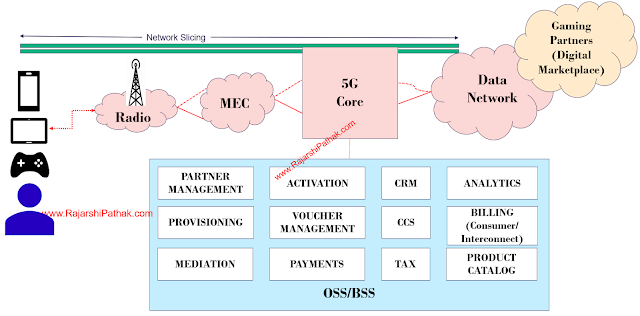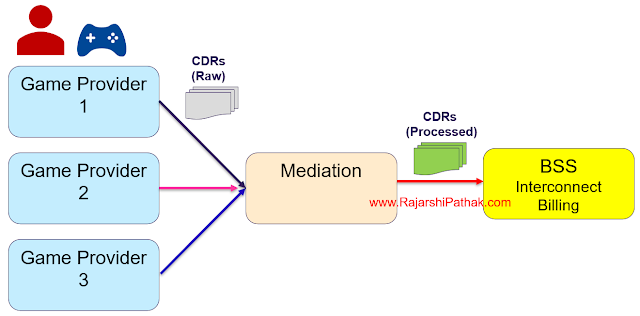OSS/BSS and Monetization For 5G Cloud Gaming
OSS/BSS and Monetization For 5G Cloud Gaming
Conceptually, E2E Implementation of 5G Cloud Gaming with OSS/BSS Integration can be shown as below:-
 |
| Click to enlarge - E2E Implementation of 5G Cloud Gaming with OSS/BSS Integration |
For 5G Cloud Gaming, below are the Key aspects from the Operator's OSS/BSS Perspective:-
- Partners Onboarding & Lifecycle Management
In this case, Games Providers or Developers can be treated as Partners. In the traditional setup for Telcos, we have a separate Partner Portal which acts as a Sales Channel for Order Acquisitions.
Any new Game Provider or Game Developer should be able to onboard or register in the Operator's Partner Portal. Once onboarded, Order Capture should be allowed against selected Games (which belong to any of the registered Game providers).
Once onboarded, the Self Serve Portal or App should also enable the corresponding Games in the User selection.
- Digital Marketplace (Sales Channel/CRM) to pick and choose Games or Games Providers
For the B2C Model, End Customers can choose their favorite Games directly or based on the list of Game Providers.
For the B2B Model, the Digital Marketplace can also be utilized as a medium for Game Providers to tie a partnership with Operators.
- Customer Fulfillment (Ordering, Activation, Billing)
Convergent BSS system can be utilized to enable new Customers for Revenue Realization. Open API Architecture needs to be followed for smoother consumption & allowance of Operator & Partners Services.
- Online Charging and Policy Control for End Consumers (Gamers)
Once Customers are captured in BSS Systems, 5G CCS and PCF can be used for Online charging and Policy Control. Policies can be based on QoE, bandwidth, latency, no. of concurrent sessions, etc.
- Network Slicing
Network Slicing capability of 5G Standalone implementation to be utilized to provision separate network slices for Gaming purposes. Via Network Slice Management, the needed Network resources are to be made available as and when a Gaming Session gets initiated or required. 5G Charging System can charge Network Slices based on Consumption.
 |
| Network Slicing and Charging for 5G Cloud Gaming |
- Product Catalogue with Multiple Rate Plans/Offers
Product Catalogue should be flexible to support all the varied 5G services. Also, the Catalogue should be a centralized repository of Products, Services, Discounts, Rate & Price Plans for Operators as well as Gaming Partners.
- Offline Charging/CDR generation & Mediation for Partners Settlement
All the Consumer's Usage events should also be captured against the respective Gaming Providers or Developers. These will generally be Offline Records in the form of CDRs. It will help Partners for settlement against the Operators. Mediation to be used for capturing & processing such Interconnect CDRs.
 |
| Mediation & Interconnect Billing for 5G Cloud Gaming |
- Interconnect Billing & Partner Settlement
The Offline Charging records captured as mentioned above are to be used for Interconnect Billing & Settlement. Here, Billing Settlement happens between 5G Telco Operator and Cloud Gaming Providers/Developers.
- Discounting Module (for Consumers as well as Partners)
Discounting can be Rating time, Billing time, One-time, or based on cross-bundling.
- Notifications (E.g. FUI, Threshold balance usage)
Since Cloud Gaming is without any lag, Notifications & associated Business Events handling will be very critical for Consumers as well as Partners.
- Top Up/Payments with Multi-Currency Handling
In-Sessions Top-Ups & Payments should be supported. Multiple Payment methods to be enabled for Consumers.
- Support for Subscription, Usage, and One Time Charges
All the types of Charges should be supported for Consumers. To learn more about different Telco Charges, you can refer to my previous article - Types of Charges in Telcos.
- Collections or Dunning Treatment
The traditional Dunning Module of BSS can be utilized for Subscription-based Services. Credit Class and Collections Treatment should be configured in the System. If a Consumer doesn't pay the bill post the Payment due date, then Collections actions should get triggered.
- Trouble Ticket (TT) Module
TT Module should be user-friendly for any After-Sales issues with Operators or Partners. Most of the issues should be handled by Consumers via a Self-Serve App or Portal and related API/Services should be exposed for troubleshooting. Knowledge Management should also be updated regularly with enhanced troubleshooting guides.
- Campaign and Promo Management
Campaigns and Promos should be created for both Consumers as well as Partners. Targeted Campaigning should be driven with the help of Flexi Rebates created by Enterprise Product Catalog.
- Loyalty Management
Extremely useful for rewarding loyal Customers. The same can be extended to Gaming Partners as well.
- Invoicing and Taxation
Invoicing and Taxation are more from the compliance perspective. Correct Billing Offers should be reflected on the Invoice and Taxation rules should be as per the regulatory requirements.
- GL and Reporting
GL Codes should be tagged correctly against the billable/non-billable events or services. Financial Reports are to be generated for reconciliation.
- Voucher Management for Prepaid Model
Prepaid Voucher Management to be utilized for selling Validity-based Gaming Offers. Vouchers can be based on different Games, Volume to be consumed, Concurrent Sessions, etc. Consumers not interested in Subscription-based Commitments with Operators can take advantage of the Prepaid Model to enjoy Cloud Gaming Service.
----------------------
Hope this article will be beneficial to you.
Kindly share this article with your friends and colleagues. Feel free to like and comment. Happy learning.











Very useful and out-of-the-box information thanks a lot RAJARSHI PATHAK !!!
ReplyDeleteThanks Mayank.
DeleteFirst of all thanks for taking time and sharing this wonderful info. please help me to understand few queries.
ReplyDelete1) The gaming products are required to configure on operators system OR it will be identified based on data consumption from online rating ?
2) How B2B2C case would be handled where some enterprise customer takes services from operator and uses for his own customer ?
3) How the network slicing works whether it would be predefined as product or it would be used runtime on demand by subscriber ?
Thank You once agin
Hi,
DeleteThanks for your queries. As you are aware, there is no standard answer to any of the queries as it depends on the implementation & business needs. However, I will provide my point of views:-
1. Gaming Partners/Games would be part of Order journey as a Product or Add-Ons. Also, Policy needs to be configured depending on Games and based on which appropriate Network Slicing needs to be triggered on Service initiation. So, "Gaming products to be configured" looks more reasonable to me.
2. For B2B2C, settlement between Operator & Enterprises can happen via Interconnect Rating & Billing. For Consumers, the offering Enterprise can use its own Subscription based billing model or can partner with Operator based on MVNO model and can utilize its Digital Marketplace, Network Slicing, Rating, Billing, etc. capabilities.
3. Network Slicing can be static or dynamic. Ex - When Session started for a High Speed Game, then predefined Network Slice 1 can be sufficient. However, if more and more Users get connected to the same Gaming Session or if it requires heavy processing usage, then Operator can dynamically initiate Network Slice 2 which supports it.
Hope it helps. For any further discussion, you can also contact me through Contact Form. Thanks.